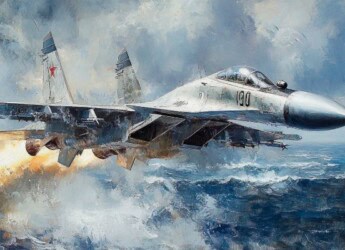|
|
Content Assessment: Avenging Ambitions? Russo-Ukrainian War Update (March 7 - 13, 2023)
Information - 93%
Insight - 94%
Relevance - 95%
Objectivity - 94%
Authority - 96%
94%
Excellent
A short percentage-based assessment of the qualitative benefit of the post highlighting the recent Ukraine conflict assessments in maps from the Institute for the Study of War.
Editor’s Note: The discipline of eDiscovery, which involves the identification, preservation, and analysis of electronic data, is increasingly being used in investigations and litigation relating to war crimes. In the case of the Russo-Ukrainian War, eDiscovery tools and techniques can be used to identify and collect electronic evidence of war crimes, such as emails, social media posts, and other digital communications that may provide valuable insights into the actions of individuals and organizations involved in the conflict. This evidence can then be used in investigations and legal proceedings to hold perpetrators of war crimes accountable for their actions. Additionally, eDiscovery can help to efficiently and effectively manage the vast amount of electronic evidence that may be relevant to war crimes cases, allowing investigators and legal teams to quickly and accurately analyze the data to identify key pieces of information. This weekly update may be useful for cybersecurity, information governance, and legal discovery professionals as they consider investigations and litigation resulting from war crimes committed during the war.
Background Note: One of the most accurate and detailed sources for ongoing updates on the Ukraine crisis is the Russian Offensive Campaign Assessment from the Institute for the Study of War. The Institute for the Study of War (ISW) is a 501(c)(3) organization and produces strictly non-partisan, non-ideological, fact-based research. ISW seeks to promote an informed understanding of war and military affairs through comprehensive, independent, and accessible open-source research and analysis. ISW’s research is made available to the general public, military practitioners, policymakers, and media members. Providing a daily synthesis of key events related to the Russian aggression against Ukraine, ISW updates may benefit investigators and litigators as they follow the business, information technology, and legal trends and trajectories impacted by and stemming from the current Russo-Ukrainian conflict.
Assessment and Maps*
Russo-Ukrainian Conflict Assessments – An Overview in Maps
- Institute for the Study of War (ISW), Russia Team
- Critical Threats Project (CTP), American Enterprise Institute
General Assessment Background Info
- ISW systematically publishes Russian campaign assessments that include maps highlighting the assessed control of terrain in Ukraine and main Russian maneuver axes.
- These maps augment daily synthetic products that cover key events related to renewed Russian aggression against Ukraine.
The Russian Offensive Campaign Assessments
- March 13, 2023
- By Riley Bailey, Karolina Hird, Kateryna Stepanenko, Grace Mappes, Layne Philipson, and Frederick W. Kagan
Key Development
- A member of the Kremlin-affiliated Valdai Discussion Club accused Wagner Group financier Yevgeny Prigozhin of pursuing political objectives in Russia that are endangering Wagner forces in Bakhmut.
Key Takeaways
- Chechen Republic Head Ramzan Kadyrov continues efforts to maintain Chechnya’s relevance in the Russian political and military sphere.
- Belarusian President Alexander Lukashenko met with Iranian officials in Tehran on March 13 to expand bilateral cooperation and bolster sanctions mitigations.
- Russian milbloggers continue to speculate about a prospective Ukrainian counteroffensive in southern Ukraine, suggesting increasing concern in the Russian information space about Ukrainian combat capabilities as Russian forces pin themselves on offensive operations in Bakhmut.
- A Russian State Duma bill aiming to raise the conscription age suggests that the Kremlin is not planning to conduct full mobilization in the future.
- The Russian military is reportedly employing the newly created “assault detachments” in different manners across different tactical situations.
- Ukrainian Deputy Prime Minister and Minister of Reintegration of Temporarily Occupied Territories of Ukraine Iryna Vereshchuk confirmed that Russia has illegally deported 2,161 Ukrainian orphans to Russia.
- Russian forces continued ground attacks throughout the Kupyansk-Svatove-Kreminna line and made marginal gains northeast of Kupyansk and east of Siversk.
- Russian forces continued making advances in and around Bakhmut but have not succeeded in completing a turning movement, envelopment, or encirclement of the city as of March 13.
- Russian forces continued to conduct ground attacks across the Donetsk Oblast front line.
- Ukrainian forces continue to conduct raids against areas in east (left) bank Kherson Oblast.
- Subordination of mobilized Russian military personnel to Donetsk and Luhansk People’s Republic (DNR/LNR) formations is generating increasing discontent.
- Russian occupation officials continue to introduce new provisions to discourage and restrict the use of the Ukrainian language in educational facilities.
- March 12, 2023
- By Kateryna Stepanenko and Frederick W. Kagan
Key Development
- The conflict between the Russian Ministry of Defense (MoD) and Wagner Group financier Yevgeny Prigozhin likely reached its climax against the backdrop of the Battle of Bakhmut. The Russian military leadership may be trying to expend Wagner forces – and Prigozhin’s influence – in Bakhmut.
Key Takeaways
- The conflict between the Russian Ministry of Defense (MoD) and Wagner Group financier Yevgeny Prigozhin likely reached its climax against the backdrop of the Battle of Bakhmut
- The Russian military leadership is likely attempting to avenge itself on Prigozhin for a conflict that he initiated in May 2022.
- Prigozhin overestimated Putin’s reliance on Wagner forces and attempted to replace Russian military and political leadership with Wagner-affiliated figures.
- Prigozhin sought to establish Wagner-affiliated military officials partly to secure greater access to Russian MoD ammunition stores and budget.
- Prigozhin’s obvious military-political ambitions likely alarmed Putin in October, when his regime was most vulnerable to public scrutiny.
- Putin is a risk-averse and highly calculating actor who likely sought to manage the emerging threat to his control by gradually reintroducing the Russian MoD into prominence and power.
- Putin had ultimately allowed the Russian MoD to retake control of the Bakhmut direction from Prigozhin in January as Wagner forces failed to deliver the promised victory over Bakhmut by the end of 2022.
- Putin and the Russian MoD may use Prigozhin as a scapegoat for the costly drive on Bakhmut once the offensive culminates.
- Prigozhin is unlikely to regain Putin’s favor to the same extent as he had between May and October 2022.
- Prigozhin is also unlikely to reach his previous heights regardless of his renewed efforts to recruit mercenaries from 42 different cities in Russia.
- The conflict between the Russian MoD and Wagner shows that different parties in Putin’s inner circle are competing with one another in potentially zero-sum games that do not further Putin’s overall objectives.
- March 11, 2023
- By Riley Bailey, Karolina Hird, George Barros, Nicole Wolkov, Angela Howard, and Frederick W. Kagan
Key Development
- Russian Foreign Ministry Spokesperson Maria Zakharova confirmed that there is infighting in the Kremlin inner circle, that the Kremlin has ceded centralized control over the Russian information space, and that Russian President Vladimir Putin apparently cannot readily fix it.
Key Takeaways
- Russian forces did not make any confirmed advances within Bakhmut on March 11.
- Wagner financier Yevgeny Prigozhin said that he would transform the Wagner Group into a hardline ideological elite parallel military organization after the Battle of Bakhmut.
- Ukrainian sources report that Ukrainian forces advanced toward Svatove.
- Russian forces continue to establish fortifications in Zaporizhia Oblast.
- Russian mobilized soldiers continue to publicize complaints that commanders treat them poorly and used them as expendable manpower to patch holes in existent formations.
- Russian occupation officials use children’s healthcare to generate dependency on the Russian healthcare system.
- March 10, 2023
- By Karolina Hird, Riley Bailey, Nicole Wolkov, Layne Philipson, George Barros, and Mason Clark
Key Development
- US intelligence warned that individuals with ties to Russian intelligence may be planning to attempt to instigate an insurrection in Moldova.
Key Takeaways
- Russian forces continue to establish defensive lines in areas in rear areas far from current frontlines and areas in Russia that will likely never see fighting.
- Russian Commissioner on Children’s Rights, Maria Lvova-Belova, confirmed that the Russian government is using a variety of schemes to deport Ukrainian children to Russia in a comment that was apparently meant to disprove Western allegations of the illegality of these actions.
- Russian sources claimed that Russian forces conducted limited ground attacks along the Svatove-Kreminna line.
- Russian sources claimed that Wagner Group forces entered the built-up AZOM industrial complex, and frontal assaults on the complex will likely be costly for Wagner Group forces.
- Russian forces made gains in Bakhmut, are clearing eastern parts of the city, and have advanced to new positions in northwestern Bakhmut within 800 meters of the AZOM metal processing plant.
- Russian forces continue reconnaissance activity near islands in the Dnipro River delta.
- The Wagner Group continues to expand efforts to recruitment efforts in Russia.
- Russian officials and occupation authorities continue to announce new infrastructure projects to increase connectivity between the Russian mainland and occupied territories.
- March 9, 2023
- By Riley Bailey, Kateryna Stepanenko, Grace Mappes, Angela Howard, George Barros, Layne Philipson, and Frederick W. Kagan
Key Development
- Russian forces conducted the largest missile strike across Ukraine of 2023 so far on March 9, but the attack likely only served Russian state propaganda objectives.
Key Takeaways
- Russian forces likely advanced northwest of Bakhmut amid a likely increased tempo of Russian offensive operations in the area.
- The Wagner Group’s offensive operation in eastern Bakhmut appears to have entered a temporary tactical pause and it remains unclear if Wagner fighters will retain their operational preponderance in future Russian offensives in the city.
- Russian forces may be preparing to resume offensive operations around Vuhledar, although persistent personnel and ammunition issues will likely continue to constrain Russian forces from advancing.
- Internal dynamics within the Russian military may be driving the potential resumption of costly offensives near Vuhledar that offer little prospect of operational benefit.
- Russian authorities are likely formalizing structures to create and coopt volunteer-based military formations under state-owned energy companies in order to distribute accountability, reduce burdens on the national budget, and avoid sanctions.
- The Transnistrian occupation government accused the Ukrainian government of involvement in a claimed terrorist plot, likely as part of the Russian information operations to undermine Ukrainian credibility and destabilize Moldova.
- Russian forces continued to conduct ground attacks throughout the Kupyansk-Svatove-Kreminna line.
- Russian forces continued offensive operations in and around Bakhmut but have not completed a turning movement or enveloped or encircled the city.
- Russian forces continued offensive operations along the outskirts of Donetsk City and near Vuhledar.
- Russian strikes completely disconnected the Zaporizhzhia Nuclear Power Plant (ZNPP) in Enerhodar, Zaporizhia Oblast, from all external power sources for 10 hours.
- Ukrainian officials reported that Russian occupation authorities are preparing for a spring 2023 mobilization wave in occupied areas of Donetsk and Luhansk oblasts that may include male teenagers born in 2006.
- Russian officials and occupation authorities are continuing efforts to integrate occupied territories into the Russian political and bureaucratic systems.
- March 8, 2023
- By Kateryna Stepanenko, Riley Bailey, Grace Mappes, George Barros, Layne Philipson, and Mason Clark
Key Development
- Wagner Group financier Yevgeny Prigozhin announced on March 8 that Russian forces captured all of eastern Bakhmut, a claim consistent with available visual evidence.
Key Takeaways
- Russian forces remain unlikely to exploit a breakthrough beyond Bakhmut if Russian forces capture the city.
- The Kremlin may be attempting to establish a new Russian government-controlled armed formation billed as a volunteer unit through the Russian state-owned energy company Gazprom.
- A US official denied that US intelligence assessed that a pro-Ukrainian group sabotaged the Nord Stream pipelines in September 2022.
- German and Polish officials announced that Germany and Poland will deliver 28 Leopard 2 tanks to Ukraine in March 2023, which will bolster Ukraine’s capabilities to conduct a counteroffensive amidst high Russian tank losses.
- Russian forces continued to conduct ground attacks on the Kupyansk-Svatove-Kreminna line.
- Russian forces continued offensive operations around Bakhmut on March 8 but have not succeeded in completing a turning movement around the city.
- Russian forces continued offensive operations along the outskirts of Donetsk City.
- Russian sources claimed that Ukrainian forces landed on the Dnipro River Delta islands for the third consecutive day.
- The Kremlin is doubling down on reviving volunteer recruitment campaigns throughout Russia and occupied Ukraine.
- Russian hospitals are continuing to form new medical centers in Russia in an effort to maximize the capacity for overfilling hospitals in occupied territories to treat wounded Russian servicemen.
- March 7, 2023
- By Karolina Hird, Grace Mappes, Nicole Wolkov, George Barros, and Mason Clark
Key Development
- Ukrainian President Volodymyr Zelensky stated on March 7 that the hypothetical Russian capture of Bakhmut would provide Russian forces an “open road” to Kramatorsk, Slovyansk, and other critical settlements in Donetsk Oblast.ISW continues to assess, however, that Russian forces lack the capability to exploit the tactical capture of Bakhmut to generate operational effects, and will likely rapidly culminate following the capture of Bakhmut.
Key Takeaways
- Russian forces likely lack the mechanized forces necessary to advance beyond Bakhmut, and the tactical “assault detachments” used in assaults against Bakhmut are likely unable to conduct maneuver warfare.
- Russian forces have likely captured the eastern part of Bakhmut east of the Bakhmutka River following a controlled Ukrainian withdrawal from eastern Bakhmut as of March 7.
- Russian Defense Minister Sergey Shoigu reiterated boilerplate rhetoric seeking to deter further Western military aid to Ukraine.
- Shoigu additionally outlined long-term and likely aspirational efforts to restore and expand the Russian officer corps.
- Russia exchanged 130 Ukrainian prisoners-of-war (POWs) for 90 Russian POWs on March 7.
- Russian independent polling organization The Levada Center released poll results that 51 percent of Russians feel negatively toward Russians who left the country due to mobilization, indicating at minimum negative feelings towards those that escaped mobilization, if not overt support for the war.
- The New York Times (NYT) stated on March 7 that low-confidence and unverified intelligence reviewed by US officials may suggest that a pro-Ukrainian group carried out an attack on the Nord Stream pipelines in September 2022, but made clear this is a very low confidence assessment.
- US Air Force General James Hecker confirmed on March 6 that the US has provided Ukraine with Joint Direct Attack Munition Extended Range (JDAM-ER) kits.
- Russian forces conducted limited ground attacks along the Kupyansk-Svatove-Kreminna line.
- Russian forces continued ground attacks along the Avdiivka-Donetsk City line.
- A Russian source claimed that Ukrainian forces attempt to conduct operations across the Dnipro River in Kherson Oblast.
- Russian federal authorities continue to place the onus of solving mobilization issues onto Russian regional authorities who then absolve themselves of ongoing Russian command issues.
- Russian occupation authorities continue to import employees from various Russian law enforcement agencies to staff vacancies in occupation administrations.
We do not report in detail on Russian war crimes because those activities are well-covered in Western media and do not directly affect the military operations we are assessing and forecasting. We will continue to evaluate and report on the effects of these criminal activities on the Ukrainian military and population and specifically on combat in Ukrainian urban areas. We utterly condemn these Russian violations of the laws of armed conflict, Geneva Conventions, and humanity even though we do not describe them in these reports.
Chronology of Maps from March 7-13, 2023 – Mouseover to Scroll
Ukraine Conflict Maps - 030723 - 031323See the Institute for the Study of War Interactive Map of the Russian Invasion
Read the latest Ukraine Conflict updates from the Institute for the Study of War
* Shared with direct express permission from the Institute for the Study of War (ISW).
About the Institute for the Study of War Research Methodology
ISW’s research methodology relies on both primary and secondary sources, enabling researchers to develop a comprehensive understanding of the situation on the ground. In order to analyze military and political developments in any given area, ISW’s research analysts must wholly understand the systems of enemy and friendly forces. They must also understand the population demographics, physical terrain, politics, and history of that area. This lays the analytical foundation for understanding the reasons for particular developments and fulfilling their assigned research objectives. ISW analysts also spend time in places like Iraq, Afghanistan, and elsewhere in order to gain a better understanding of the security and political situation and to evaluate the implementation of current strategies and policies. Our researchers compile data and analyze trends, producing a granular analysis of developments in areas of research, producing an accurate, high-resolution, timely, and thorough picture of the situation. ISW’s research methodology guarantees its success and commitment to improving the nation’s ability to execute military operations, achieve strategic objectives, and respond to emerging problems that may require the use of American military power.
About the Institute for the Study of War
The Institute for the Study of War advances an informed understanding of military affairs through reliable research, trusted analysis, and innovative education. We are committed to improving the nation’s ability to execute military operations and respond to emerging threats in order to achieve U.S. strategic objectives. ISW is a non-partisan, non-profit, public policy research organization.
Learn more, get involved, and contribute today.
Additional Reading
- From Dissent to OSINT? Understanding, Influencing, and Protecting Roles, Reputation, and Revenue
- [Annual Update] International Cyber Law in Practice: Interactive Toolkit
- Data Embassies: Sovereignty, Security, and Continuity for Nation-States
Source: ComplexDiscovery



























